7 Countries That Refuse To Celebrate Valentines Day
Valentine’s Day is a special occasion where people show their love and appreciation for one another through thoughtful gifts and heartfelt sentiments. While it’s often associated with February 14th, the spirit of expressing affection shouldn’t be limited to just this day. In fact, Valentine’s Day has a rich history that dates back to the Middle Ages, and its evolution is fascinating. What many people may not know is that Valentine’s Day is primarily a Western Christian holiday.
Its origins can be traced back to the Ancient Romans, but it has undergone significant changes over time. While February 14th is considered an important cultural and religious celebration of romance in the Catholic Church, not everyone observes this day. In fact, several Eastern countries have chosen not to celebrate Valentine’s Day, either commercially or otherwise. This raises an interesting point – what drives these countries to shun Valentine’s Day?
A closer look reveals that seven countries in particular have banned the holiday due to their unique religious beliefs. These nations may have different cultural and social norms surrounding romance and relationships, leading them to prioritize other celebrations over Valentine’s Day.
Malaysia

Malaysia’s predominantly Muslim population has a complex relationship with Valentine’s Day. The Islamic authorities have long deemed the celebration as contradictory to Islamic Law. Since 2005, they’ve issued fatwas, effectively banning its observance. In 2011, this ban was enforced through a series of high-profile raids by the morality police (JAIS).
Eighty Muslim couples were arrested for celebrating the holiday, and hotels in Selangor and Kuala Lumpur were targeted as part of an anti-Valentine’s Day campaign.
Indonesia
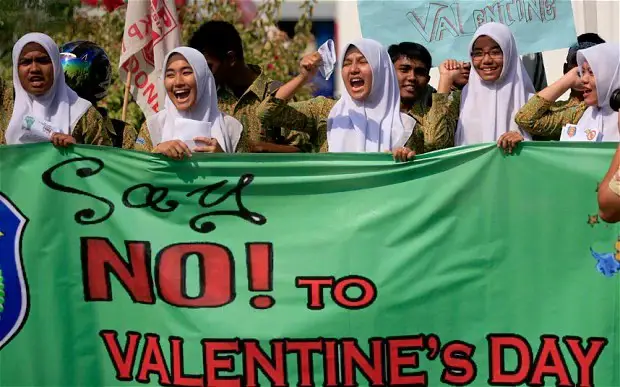
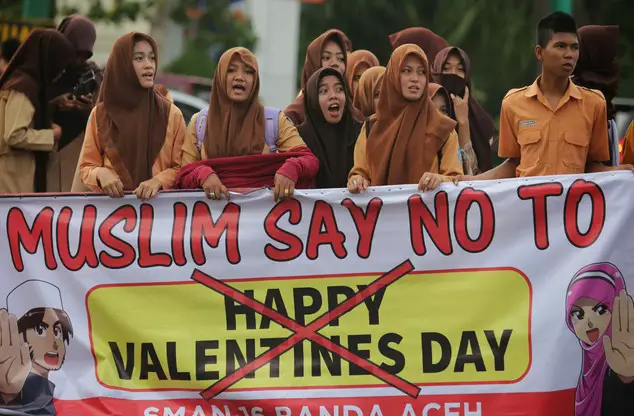
In Indonesia, a nation where Islam is the dominant religion, Valentine’s Day has sparked controversy among religious officials and clerics. They have been vocal in their efforts to ban the holiday, citing its perceived promotion of casual pre-marital sex and alcohol consumption – both of which are forbidden by Islamic law. Nevertheless, Jakarta, the country’s capital, has become a hotspot for celebrating Valentine’s Day, with businesses seizing the opportunity to capitalize on the festivities.
Iran

India
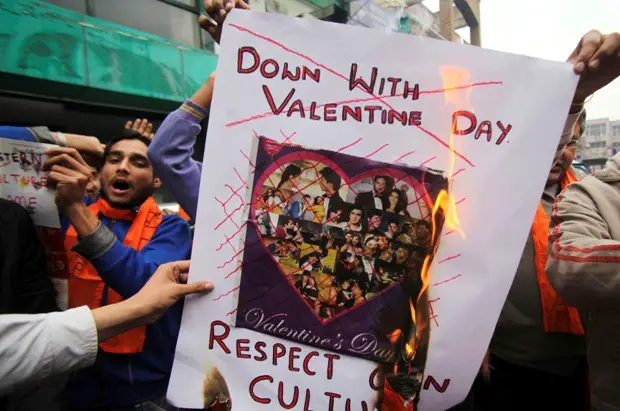
In the aftermath of India’s independence from British rule in 1947, the government deliberately distanced itself from Western cultural and moral values. This stance has had a lasting impact on Indian society, particularly with regards to relationships and marriage.
For instance, in 2015, Chandra Prakash Kaushik, a prominent figure within the ruling party, made headlines when he declared that couples who are in love should get married if they are certain about their feelings, rather than openly displaying affection without making a long-term commitment.
Pakistan
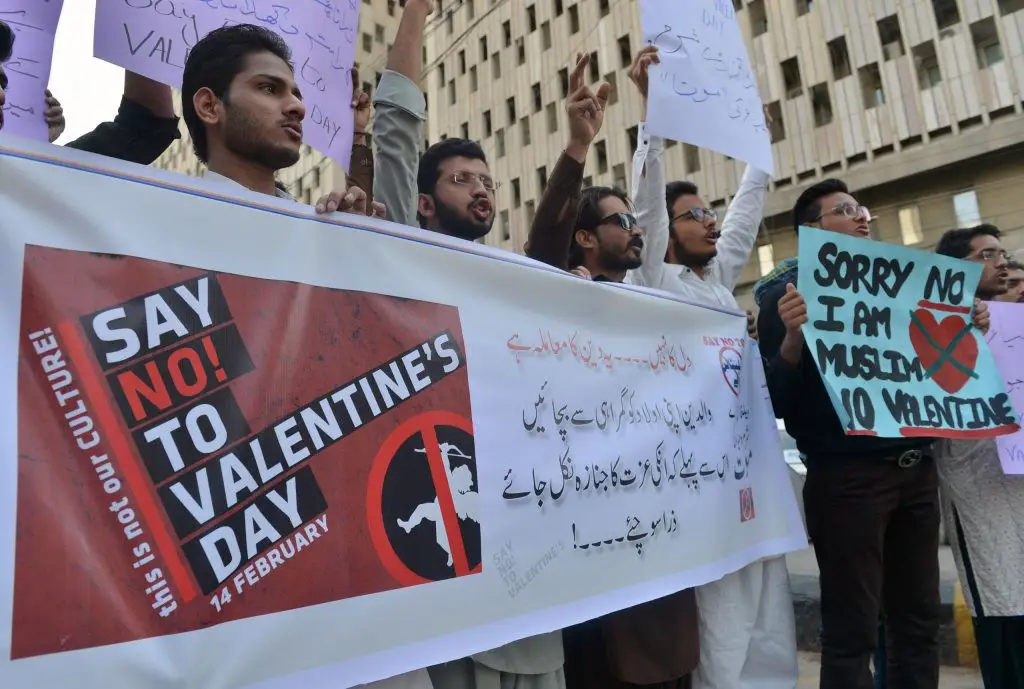
In recent years, Pakistan has witnessed several instances of unrest surrounding Valentine’s Day. A notable incident occurred in 2014 when two universities in Peshawar clashed over their differing views on the holiday, as interpreted by Islamic law. The dispute escalated to a physical confrontation, resulting in rock-throwing and eventually, gunshots fired from both sides, leaving three students injured.
Fast forward to February 7th, 2018, the Islamabad High Court issued a ban on Valentine’s Day celebrations, citing the holiday as a cultural import from the West that is ‘against the teachings of Islam.’
Saudi Arabia

In Saudi Arabia, public displays of affection are frowned upon, making the concept of Valentine’s Day incompatible with the country’s values. In fact, celebrating this holiday can have severe consequences. A notable example is the case in 2014 where five Saudi citizens were sentenced to a combined total of 39 years in prison and 4,500 lashes for dancing with six women they weren’t married to on Valentine’s Day.
As a result, red roses and other love-themed items are strictly prohibited on this day, including any clothing bearing the iconic color.
Russia
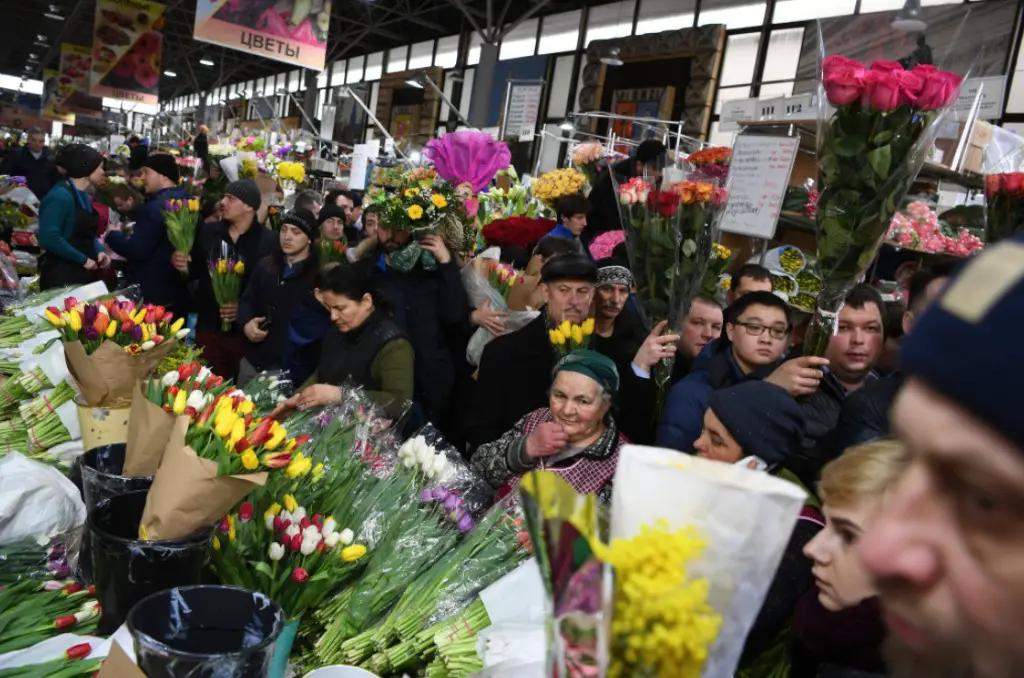
In Russia, International Women’s Day on March 8th serves as a unique alternative to Valentine’s Day. While the celebrations share some similarities with Western-style romantic gestures, such as exchanging flowers and chocolates, the focus is distinct. On this day, it’s customary for husbands and boyfriends to take on domestic duties, allowing women to relax and recharge.
The holiday’s origins stem from a desire to honor the love and dedication Russian women bring to their families, rather than a saintly figure. As such, International Women’s Day becomes a celebration of gender equality and appreciation for the women in one’s life, as well as those around the world.






